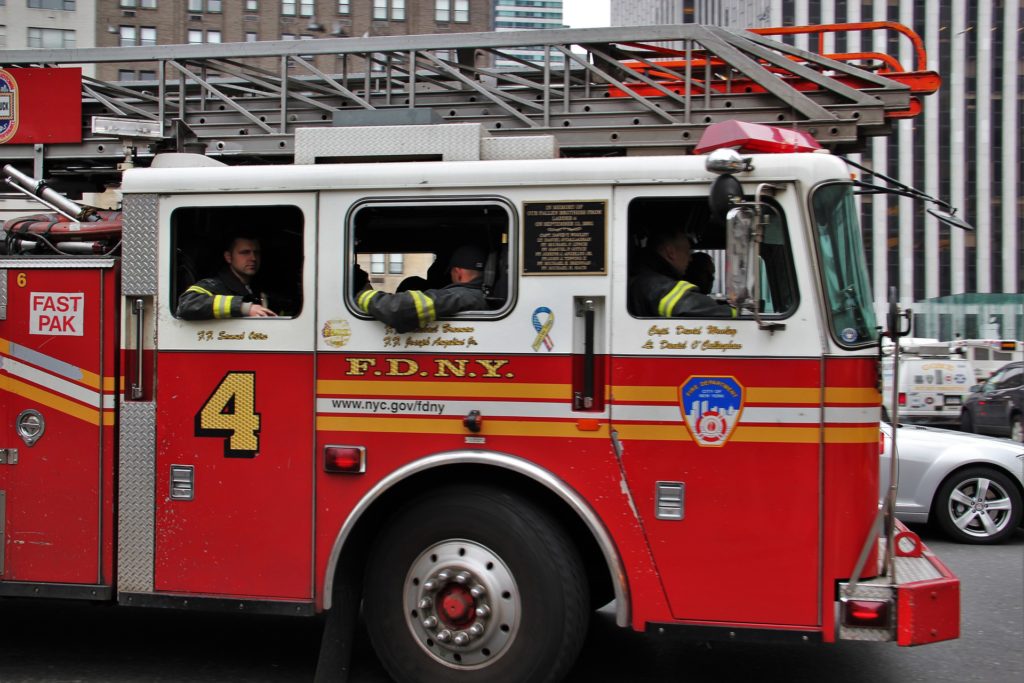 New York’s Bravest! When the rest of us run from a fire or disaster, firefighters lead the charge into buildings to save lives and contain the fire damage. Firefighting is one of the most dangerous non-military jobs around.
New York’s Bravest! When the rest of us run from a fire or disaster, firefighters lead the charge into buildings to save lives and contain the fire damage. Firefighting is one of the most dangerous non-military jobs around.
Firefighters encounter treacherous conditions, making the potential for serious injury quite high. Firefighters also work around carcinogens like smoke, resulting in a particular risk for cancer. While workers’ compensation exists to help firefighters who are injured or become sick while on the job, insurance companies are sometimes reluctant to pay out on these claims.
Top Occupational Dangers for Firefighters
- Falls: Working in elevated areas, using ladders, and walking on damaged floors can all lead to a fall from heights. Compared to the heat of a fire, a fall might seem minor, but injuries from falls can be serious. Since firefighters are required to wear heavy gear, the additional weight can make fall injuries more serious.
- Collapsing structures: When fires and other disasters damage buildings, the structural integrity may be compromised. Walls, ceilings, chimneys, and other structures could collapse onto a firefighter. Fire escapes and window air-conditioners can also become dangerous as the walls they are anchored to begin to crumble.
- Fires: Of course, fires present serious dangers to firefighters. All firefighters wear protective gear to shield them against the intense heat, but such protection has its limits. Firefighters have to suppress a basic human instinct to stay away from fire in order to do their jobs, and they can suffer serious burn injuries when things go wrong.
- Smoke inhalation: Though firefighters wear masks, there is still potential for some smoke inhalation. Breathing smoke can cause immediate injuries, including lung and brain damage due to a lack of oxygen. Long-term exposure to smoke has serious health implications and may result in heart disease and cancer.
- Heart disease: Nearly half of work-related deaths among firefighters are actually caused by heart disease, largely due to the working conditions. Smoke inhalation, the heavy physical strain of equipment, and stress can all create cardiac issues. Heart attacks and other illnesses are covered by workers’ compensation, same as work-related trauma.
- Stress: Stress can increase the likelihood of other conditions, such as a heart attack; it can trigger panic attacks, heart disease, ulcers, and increase the likelihood of smoking cigarettes. Sometimes stress can make it harder for a person to quit smoking.
- Cancer: The biggest health risk for firefighters is cancer, due to long-term exposure to carcinogenic substances. Basic smoke from a wood fire contains cancer-causing chemicals, and smoke from apartment or factory buildings can be far more dangerous. In general, firefighters are at higher risk for colon, brain, and kidney cancer due to their exposure to dangerous chemicals and smoke.
Does Workers’ Comp Cover Cancer?
Workers’ compensation is an insurance that employers provide for their employees. If a work-related situation causes an injury or illness to an employee, a claim can be filed with the insurance provider to help cover the costs of that injury or illness.
For government employees like firefighters, New York City has workers’ compensation insurance to cover them. Volunteer firefighters can also file workers’ compensation claims, thanks to a recently passed law here.
“Presumptive” cancers should always be covered by workers’ compensation. These include skin cancer and cancers affecting the lymphatic, digestive, neurological, breast, reproductive, and prostate systems. While these presumptive cancers are covered by workers’ compensation, that does not mean insurers are always willing to pay out the claim.
Can You Appeal a Denied Workers’ Comp Claim?
Workers’ comp claims can be initially denied by the insurance company, including claims filed by firefighters. There is a process to appeal the denial and take the claim to an advisory board, which reviews the case and either upholds the denial or orders the insurer to pay the claim. But this process can get bogged down in bureaucratic red tape.
Consult an experienced NY firefighters workers’ comp lawyer after a serious injury or illness. Wingate, Russotti, Shapiro, Moses & Halperin, LLP, can help with the paperwork, and if your claim is denied, deal with the appeals process.
If there is suspected negligence involved in your injury or illness, we’ll file a lawsuit to help compensate you for your suffering and additional expenses. For a free consultation with a top New York personal injury lawyer, call us at (212) 986-7353 today.